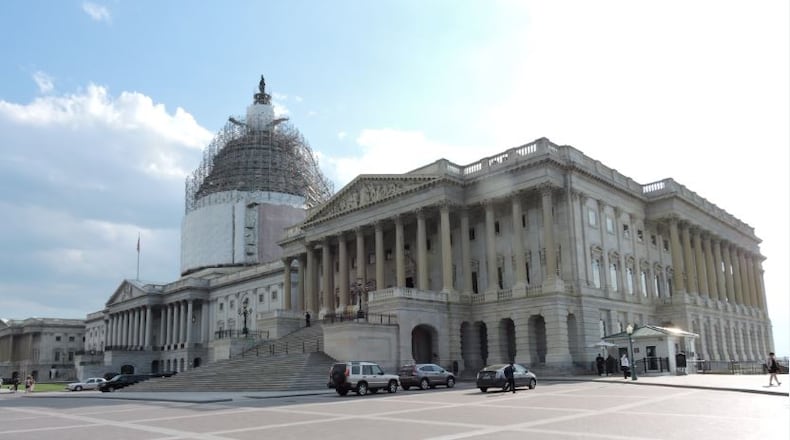After failing to move forward on legislation dealing with intelligence surveillance reform before Memorial Day, Senators will return to work on Sunday afternoon facing a midnight deadline to renew several expiring provisions of the anti-terrorism Patriot Act.
For President Obama and many in both parties in the Congress, the simplest thing to do is for the Senate to just accept the "USA Freedom Act" - a bipartisan bill that was easily approved in the House, which makes surveillance changes and reforms.
The most notable part of that plan would end the bulk collection of telephone records by the National Security Agency; but the NSA could still gain access to phone records by going through more normal procedures involving court warrants.
Credit: Jamie Dupree
Credit: Jamie Dupree
It's important to remember that despite what you may hear on social media, the entire Patriot Act does not expire on Sunday - instead there are three very specific provisions of surveillance law that would sunset:
+ Section 215 of the Patriot Act, which has allowed the bulk collection of phone and other records by the government. As mentioned above, it would be replaced by a structure that still allows the feds to get access to phone and other records.
+ A provision on "roving wiretaps" that gives the feds the power to keep track of terror suspects who constantly switch phones in order to avoid intelligence surveillance
+ The "lone wolf" provision which allows surveillance of individuals who are considered terrorist threats, but who are not known to be affiliated with a specific terror group.
The roving wiretap and lone wolf provision have strong support in the Congress, but at this point, they would expire if no deal can be reached on Sunday night.
"I sure hope Congress figures out a way to make sure I don't lose these essential tools," said FBI Director James Comey in recent days.
Top officials from the President on down have made that case since Memorial Day.
"Without action from the Senate, we will experience a serious lapse in our ability to protect the American people," said Attorney General Loretta Lynch last week.
The push by the Obama Administration has isolated GOP Senators, who find themselves holding out for some changes in the NSA reform bill approved by the House - but that's being frowned on by many House Republicans.
"The Senate has failed to make the important reforms necessary, jeopardizing Americans’ civil liberties and our national security," said Rep. Bob Goodlatte (R-VA), who urged the Senate to simply accept the USA Freedom Act and move on.
But so far, Senate Majority Leader Mitch McConnell has resisted that option; there were 57 votes in the Senate for the USA Freedom Act - but 60 were needed to force action.
One problem for McConnell though, is his fellow Senator from Kentucky, Rand Paul - as Paul is promising to do whatever he can to block action by the Senate.
Credit: Jamie Dupree
Credit: Jamie Dupree
USA Freedom Act
As President Obama and other officials urged the Senate to act, they have also more publicly endorsed the USA Freedom Act, which was approved by the House on a vote of 338-88.
Also behind that measure, the Director of National Intelligence, James Clapper.
"At this late date, prompt passage of the USA FREEDOM Act by the Senate is the best way to minimize any possible disruption of our ability to protect the American people," said Clapper in a statement.
What exactly is in the USA Freedom Act? Why don't we take a minute to look at some of the contents of the bill:
TITLE I—FISA BUSINESS RECORDS REFORMS
Sec. 101. Additional requirements for call detail records.
Sec. 102. Emergency authority.
Sec. 103. Prohibition on bulk collection of tangible things.
Sec. 104. Judicial review.
Sec. 105. Liability protection.
Sec. 106. Compensation for assistance.
Sec. 107. Definitions.
Sec. 108. Inspector General reports on business records orders.
Sec. 109. Effective date.
Sec. 110. Rule of construction.
TITLE II—FISA PEN REGISTER AND TRAP AND TRACE DEVICE REFORM
Sec. 201. Prohibition on bulk collection.
Sec. 202. Privacy procedures.
TITLE III—FISA ACQUISITIONS TARGETING PERSONS OUTSIDE THE UNITED STATES REFORMS
Sec. 301. Limits on use of unlawfully obtained information.
TITLE IV—FOREIGN INTELLIGENCE SURVEILLANCE COURT REFORMS
Sec. 401. Appointment of amicus curiae.
Sec. 402. Declassification of decisions, orders, and opinions.
TITLE V—NATIONAL SECURITY LETTER REFORM
Sec. 501. Prohibition on bulk collection.
Sec. 502. Limitations on disclosure of national security letters.
Sec. 503. Judicial review.
TITLE VI—FISA TRANSPARENCY AND REPORTING REQUIREMENTS
Sec. 601. Additional reporting on orders requiring production of business records; business records compliance reports to Congress.
Sec. 602. Annual reports by the Government.
Sec. 603. Public reporting by persons subject to FISA orders.
Sec. 604. Reporting requirements for decisions, orders, and opinions of the Foreign Intelligence Surveillance Court and the Foreign Intelligence Surveillance Court of Review.
Sec. 605. Submission of reports under FISA.
TITLE VII—ENHANCED NATIONAL SECURITY PROVISIONS
Sec. 701. Emergencies involving non-United States persons.
Sec. 702. Preservation of treatment of non-United States persons traveling outside the United States as agents of foreign powers.
Sec. 703. Improvement to investigations of international proliferation of weapons of mass destruction.
Sec. 704. Increase in penalties for material support of foreign terrorist organizations.
The text of the USA Freedom Act is available here.
The text of the report on that bill (with lots of explanatory detail) is available here. (Bill summary starts on page 17.)
About the Author




